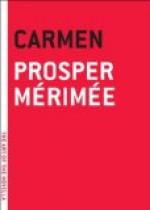So bent was my Dominican friend on my seeing the preparations for this “neat little hanging job” that I was fain to agree. I went to see the prisoner, having provided myself with a bundle of cigars, which I hoped might induce him to forgive my intrusion.
I was ushered into Don Jose’s presence just as he was sitting at table. He greeted me with a rather distant nod, and thanked me civilly for the present I had brought him. Having counted the cigars in the bundle I had placed in his hand, he took out a certain number and returned me the rest, remarking that he would not need any more of them.
I inquired whether by laying out a little money, or by applying to my friends, I might not be able to do something to soften his lot. He shrugged his shoulders, to begin with, smiling sadly. Soon, as by an after-thought, he asked me to have a mass said for the repose of his soul.
Then he added nervously: “Would you—would you have another said for a person who did you a wrong?”
“Assuredly I will, my dear fellow,” I answered. “But no one in this country has wronged me so far as I know.”
He took my hand and squeezed it, looking very grave. After a moment’s silence, he spoke again.
“Might I dare to ask another service of you? When you go back to your own country perhaps you will pass through Navarre. At all events you’ll go by Vittoria, which isn’t very far off.”
“Yes,” said I, “I shall certainly pass through Vittoria. But I may very possibly go round by Pampeluna, and for your sake, I believe I should be very glad to do it.”
“Well, if you do go to Pampeluna, you’ll see more than one thing that will interest you. It’s a fine town. I’ll give you this medal,” he showed me a little silver medal that he wore hung around his neck. “You’ll wrap it up in paper”—he paused a moment to master his emotion—“and you’ll take it, or send it, to an old lady whose address I’ll give you. Tell her I am dead—but don’t tell her how I died.”
I promised to perform his commission. I saw him the next day, and spent part of it in his company. From his lips I learned the sad incidents that follow.
CHAPTER III
“I was born,” he said, “at Elizondo, in the valley of Baztan. My name is Don Jose Lizzarrabengoa, and you know enough of Spain, sir, to know at once, by my name, that I come of an old Christian and Basque stock. I call myself Don, because I have a right to it, and if I were at Elizondo I could show you my parchment genealogy. My family wanted me to go into the church, and made me study for it, but I did not like work. I was too fond of playing tennis, and that was my ruin. When we Navarrese begin to play tennis, we forget everything else. One day, when I had won the game, a young fellow from Alava picked a quarrel with me. We took to our maquilas,* and I won again. But I had to leave the neighbourhood. I fell




